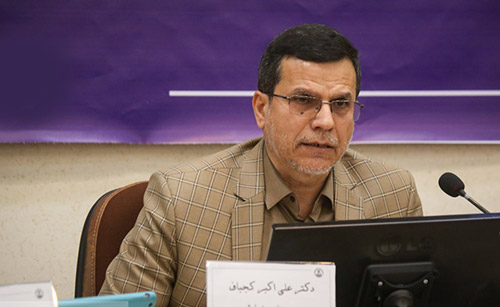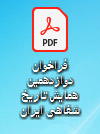Interview with the secretary of the twelfth Iran Oral History Conference
Oral history of the Holy Defense industry, engineering and logistics
Maryam Asadi Jafari
Translated by Natalie Haghverdian
2019-5-21
Conference with focus of the Holy Defense industry, engineering and logistics was issued while the history faculty of the Isfahan University had the scientific leadership of the conference. Considering that oral history is the focus of this university, Dr. Aliakbar Kajbaf, member of the scientific board of the faculty of history of Isfahan University was elected as the secretary of the conference and Dr. Morteza Nouraie, was the scientific secretary and Dr. Aliakbar Jafari was the executive secretary of the conference. The conference notice, was our reason to have an interview with Dr. Aliakbar Kajbaf.
The eleventh Iran Oral History Conference was on “Oral History Production”. Why was the Holy Defense industry, engineering and logistics selected as the topic for the twelfth conference? Since these three topics are ignored and not just in the field of oral history.
The Isfahan University and the Iran Oral History Association have a history of collaboration in the matters of arranging the Holy Defense Oral History workshops and conferences. In light of the workshops arranged by the Isfahan University or other universities, meetings were arranged with military organizations. These meetings coincided with the twelfth Iran Oral History Conference and the topic of the Holy Defense industry, engineering and logistics was discussed in the coordination meetings. Considering that the Research Department of the university along with the faculty of history of the Isfahan University have specialized activities in the field of the Holy Defense Oral History, this topic was raised with them. On the other hand, the Isfahan Steel Company, Ministry of Jihad, Isfahan University and other departments including the Ministry of Education have had a significant role in the logistics and dispatch of forced during the Holy Defense. The Oral History Association agreed to the topic of the Holy Defense industry, engineering and logistics oral history and after the unanimous agreement of the meeting members the date and other arrangements of the conference were decided upon. The supreme council of the conference include the Iran Oral History Association, Faculty of History of Isfahan University, the Department of preserving the relics and advocacy of the Holy Defense values of Isfahan province, Imam Hossein 14th Army, Saheb Alzaman Guardian Forces, The oral history department of Isfahan 44 artillery and the Art Division.

Do the articles have to be focused on the role of Isfahan during the Holy Defense?
No. We have decided to collect research articles on the Holy Defense industry, engineering and logistics oral history; no, it doesn’t necessarily have to be focused on the role of Isfahan during the war, it includes other provinces and counties. Hereby, I would like to call on all professors, researchers and scholars to submit the summary of their research results to the secretariat of the conference. After the assessment of the summary articles, communications will be made to request the original articles.
One of the sub-subjects of the notice is documentation and administrative archives. Organizations and institutions such as the Army, the Guardian Forces, Jihad and Oil Industry have massive archives on war. However, there is a problem here. Each organization considers its archives to be unique and there is limited document interaction between them. Will this conference be effective in facilitating such transactions between organizations and researchers?
The issue was discussed in numerous meetings. Some had your argument that lack of access to documents is problematic for the researchers. A couple of institutions and organizations declared that they are open to share relevant documents with the researchers for the production of such articles.
They might need guarantees for the return of the documents.
For a fact, research and production of thesis in Isfahan University such as women’s role in the war would not have been possible unless with the collaboration of military institutions. The students would refer to these institutions and receive the documents and make copies. I hope that the twelfth conference will be a turning point of interaction between the Army, Foundation of Martyrs and Veterans Affairs, the National Library, and the Art Department.
In the field of engineering we witnessed innovations during the war like Besat Bridge which were also used during the flood in the south of the country. Do you intend to collect the oral history of such innovations in the form of articles?
Yes. Even articles on the manufacture of military artillery at the beginning of the war as far as it doesn’t jeopardize the national security. The active youth, despite the restriction imposed by sanctions during the war were able to resolve some issues of the Holy Defense which were the results of successful operations during those years.
Do you intend to cover archiving pathology and methodology of the custodians of the Holy Defense in the conference?
There have been discussions around this issue but they will be arranged in the form of workshops. If the situation allows, training workshops will be arranged on the methods of effective war oral history works such as interview, memory writing, war historiography and production and we will have technical panels. We invite all professors, university students and researchers to share their experiences to be recorded for the future. The articles will be delivered in the form of speeches and posters.
The notice of the Twelfth Oral History Conference was provided in collaboration with the Iran Oral History Association and Isfahan University. Administrative and Military Affairs, Dispatch and Logistics, Industry; innovations and creativity, administrative documentation and archiving, technical units in administrations and other relevant topics will be the focus of the conference.
6 June 2019 is the deadline to submit the summary articles and the 6 July 2019 is the deadline to submit the original articles. The articles have to be in Word format and preferably typed in Lotus and submitted to Iranian.oha@gmail.com.
The conference will be held on 16 July 2019 in the Faculty of Human Sciences in the Isfahan University.
Number of Visits: 4062








The latest
Most visited
Attack on Halabcheh narrated
With wet saliva, we are having the lunch which that loving Isfahani man gave us from the back of his van when he said goodbye in the city entrance. Adaspolo [lentils with rice] with yoghurt! We were just started having it when the plane dives, we go down and shelter behind the runnel, and a few moments later, when the plane raises up, we also raise our heads, and while eating, we see the high sides ...The Arab People Committee
Another event that happened in Khuzestan Province and I followed up was the Arab People Committee. One day, we were informed that the Arabs had set up a committee special for themselves. At that time, I had less information about the Arab People , but knew well that dividing the people into Arab and non-Arab was a harmful measure.Kak-e Khak
The book “Kak-e Khak” is the narration of Mohammad Reza Ahmadi (Haj Habib), a commander in Kurdistan fronts. It has been published by Sarv-e Sorkh Publications in 500 copies in spring of 1400 (2022) and in 574 pages. Fatemeh Ghanbari has edited the book and the interview was conducted with the cooperation of Hossein Zahmatkesh.Is oral history the words of people who have not been seen?
Some are of the view that oral history is useful because it is the words of people who have not been seen. It is meant by people who have not been seen, those who have not had any title or position. If we look at oral history from this point of view, it will be objected why the oral memories of famous people such as revolutionary leaders or war commanders are compiled.


